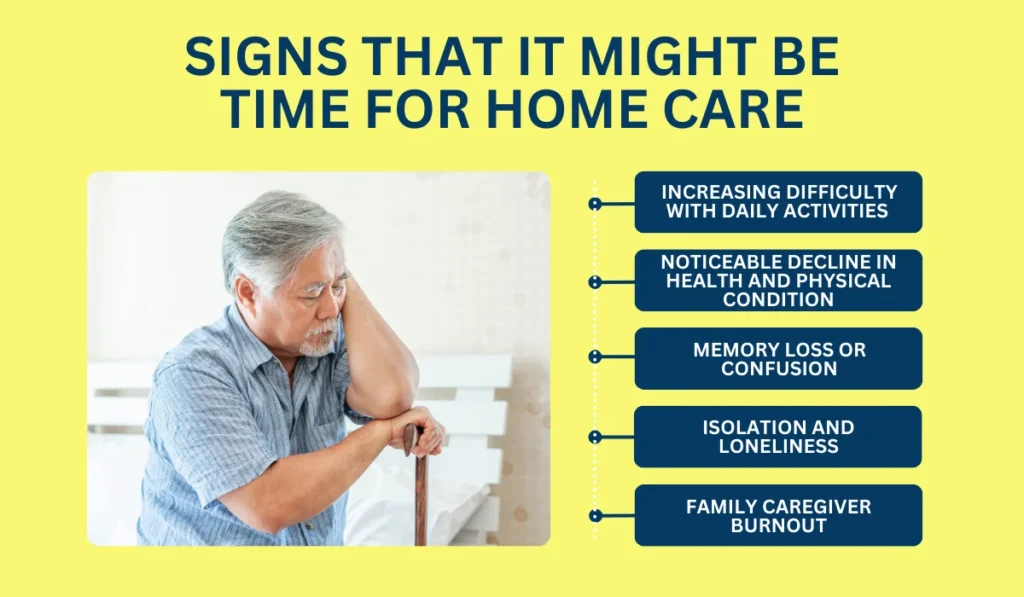If you’re like most people, you want to support your aging family members as much as possible. But knowing when they need more help can be tough. Any subtle signs can be easy to miss, yet they can have a big impact on their safety, health, and overall well-being.
In this article, we’ll look at five key signs that suggest it may be time to explore home care services and also how to tell when professional in-home care is the right choice for your loved one.
Key Takeaways
- Struggles with daily activities like bathing, dressing, or eating may signal the need for home care assistance.
- Physical health concerns, such as frequent falls or chronic conditions worsening, are warning signs that extra support is required.
- Cognitive decline, including memory loss and confusion, can create safety risks, making professional care essential.
- A variety of care options—such as in-home care, assisted living facilities, and home health aides—are available to meet your loved one’s specific needs.

1. Increasing Difficulty with Daily Activities (ADLs)
When your loved one begins to struggle with everyday tasks, such as bathing, dressing, or even eating, it may signal that they need additional support.
These Activities of Daily Living (ADLs) are essential for maintaining personal hygiene and well-being.
If you notice that these tasks are becoming increasingly difficult or neglected, it may be time to consider in-home care.
Some signs to watch for include:
- Challenges with personal hygiene
- Struggling to get dressed
- Difficulty making it to the bathroom
- Eating difficulties
2. Noticeable Decline in Health and Physical Condition
A gradual or sudden decline in physical health can be a major concern. When your loved one starts having difficulty with things they used to manage easily, it could mean they need more help to stay safe and healthy. Look out for these signs:
- Frequent falls
- Unexplained weight loss
- Difficulty walking or standing up from chairs
- Constant fatigue, even after resting
Also, if you notice chronic conditions like diabetes or arthritis becoming harder to control, it might be time to consider what extra care or adjustments can help them manage their health better.
3. Memory Loss or Confusion
Cognitive issues like memory loss, confusion, or poor decision-making are often linked to aging-related conditions like Alzheimer’s disease or dementia.
These impairments can lead to unsafe situations, such as wandering, forgetting important tasks, or mishandling medications.
That said, try to keep an eye out for the following signs of cognitive decline for safety’s sake:
- Forgetting recent events, appointments, or familiar routines.
- Becoming confused about time, place, or familiar surroundings.
- Struggling with judgment or basic choices, such as what to wear or when to eat.
- Mismanaging medications or leaving appliances on, which can lead to dangerous situations.
4. Isolation and Loneliness
Isolation is a big concern for older adults, especially those living alone. It can lead to feelings of loneliness, depression, and even affect their physical and mental health.
In fact, research shows that social isolation can increase the risk of developing heart disease, anxiety, cognitive decline, and more, making it crucial to help your loved one stay socially connected.
That’s why staying socially engaged through regular conversations, visits with family and friends, and participating in group activities can make such a difference.
5. Family Caregiver Burnout
Caring for a loved one can take a significant emotional and physical toll, often leading to burnout. When you’re responsible for someone else’s well-being, it’s easy to overlook your own needs.
Recognizing signs of burnout is crucial to maintaining your health and the quality of care you provide. Here are some common signs you may be experiencing caregiver strain and burnout:
- Persistent exhaustion
- Irritability or mood swings
- Withdrawal from social activities:
- Difficulty focusing
If you notice these signs, it might be time to explore respite care options. This type of care offers you a much-needed break while ensuring your loved one continues to receive the support they need.